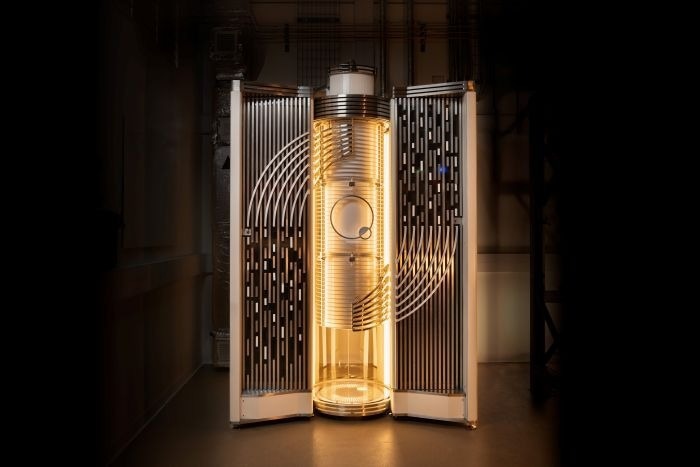Quantum Motion has delivered the industry’s first full-stack quantum computer to be built using a standard silicon CMOS chip fabrication process – the same transistor technology used in conventional computers. Deployed at the UK National Quantum Computing Centre (NQCC), this is the first full-stack quantum computer to use mass manufacturable 300 mm silicon CMOS wafer technology and the first silicon spin-qubit computer installed under the NQCC’s Quantum Computing Testbed Program.
 Quantum Motion Industry First Silicon CMOS Quantum Computer in place at NQCC. Image Credit: Christy Nunns and Quantum Motion
Quantum Motion Industry First Silicon CMOS Quantum Computer in place at NQCC. Image Credit: Christy Nunns and Quantum Motion
The system integrates the company’s Quantum Processing Unit (QPU) with a user interface and control stack compatible with industry standard software frameworks, such as Qiskit and Cirq, making it a full-stack solution. The system has a data-centre-friendly footprint of just three 19” server racks, housing the dilution refrigerator and integrated control electronics. Auxiliary equipment is designed to sit separately, enabling it to fit in standard data-centre environments and supporting upgrades to much larger QPUs without any change to the system footprint.
“This is quantum computing’s silicon moment,” said James Palles-Dimmock, CEO, Quantum Motion. “Today’s announcement demonstrates you can build a robust, functional quantum computer using the world’s most scalable technology, with the ability to be mass-produced.”
Dr Michael Cuthbert, Director of NQCC, added: “The NQCC is accelerating UK quantum capabilities by evaluating a number of diverse hardware platforms by leading companies worldwide. The successful installation of Quantum Motion’s system marks an important step forward in the NQCC's quantum computing testbeds initiative. The NQCC team are really excited to start test and validation of the system and better understand how real-world applications will map onto its silicon architecture.”
UK Science Minister Lord Vallance said: “Our National Quantum Computing Centre offers a unique space for innovators to trial new quantum technologies. This new form of quantum computer from Quantum Motion will take this groundbreaking technology another step closer to commercial viability – which could help support healthcare with faster drug discovery or clean energy by optimizing energy grids.”
Unlike other quantum computing approaches, Quantum Motion’s architecture leverages high-volume industrial chipmaking to produce qubits, using industry standard 300?mm processes from commercial chip foundries. Quantum Motion’s architecture, control stack and manufacturing approach is designed to scale to host millions of qubits, enabling fault tolerant, utility-scale and commercially viable quantum computing.
Quantum Motion’s QPU is based on a scalable tile architecture which integrates all the needed compute, readout, and control elements into a dense array that can be repeatedly printed onto a chip, enabling future expansion to millions of qubits per QPU. This design enables systems to be easily upgraded by installing future generation QPUs. The system also represents a breakthrough in AI machine-learning tuning, enabling more efficient operation and automated algorithms for control and calibration.
“With the delivery of this system, Quantum Motion is on track to bringing commercially useful quantum computers to market this decade,” said Hugo Saleh, President and CCO, Quantum Motion. “It’s a customer, user, and developer first approach – using standard CMOS, the basis for all modern technology, from mobile phones to AI GPUs, to deliver the revolutionary next inflection point in computing.”
Alongside the UK government funded NQCC testbed initiative, Quantum Motion was recently awarded the SiQEC silicon quantum error correction project to demonstrate fault-tolerant silicon-based quantum computing and is an active performer in DARPA’s QBI.